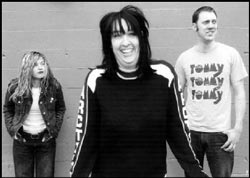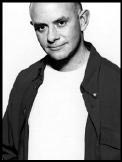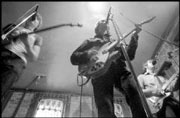“I’ve been sitting here talking about my relationships, really serious stuff,” says Visqueen singer Rachel Flotard, “and she keeps interrupting to point out a certain drum fill.””Yeah,” admits bassist Kim Warnick, “I’m like, ‘Uh-huh, that’s really interesting and—wait, wait, check out this part right here!” she says slashing away at an imaginary cymbal.
It’s happy hour at the end of a long work week, and the members of Visqueen—Flotard, Warnick, and drummer Ben Hooker—have gathered at Capitol Hill’s Satellite Lounge to discuss life, love, and, apparently, percussion on the David Bowie records blaring over the bar’s sound system.
Sharing drinks and conversation with the band, it doesn’t take long to suss out or be swayed by their distinctive personalities: Warnick’s unbridled energy, Flotard’s easy charm, or Hooker’s self-effacing middleman routine. In fact, hanging out with Visqueen is an experience not unlike listening to them play—a barely contained barrage of piss-takes, personal chemistry, and sugar-rush choruses. And their songs, like the band itself, have a way of sticking in your head long after the music is done.
VISQUEEN’S SLOW BIRTH came about with the death of Hooker and Flotard’s previous combo, Halfacat, which breathed its last in early 2001.
“After Halfacat broke up, Ben and I continued playing in our practice space like a couple losers, crying a lot, and wondering what the hell we were gonna do,” says Flotard.
The pair eventually decided to soldier on and began the search for a new bass player. Fate delivered them one in the person of Fastback Kim Warnick.
“One day I’m driving in the car with [a friend] and I’m saying, ‘God, I don’t know what bass players there are out there I’d want to play with,'” recalls Flotard. “‘What about Kim Warnick?’ Just then this jalopy pulls up next to us at the stoplight . . . and it was Kim.”
Further coincidence: It turned out Warnick had caught one of Halfacat’s final shows and was immediately taken by Flotard’s propulsive pop vignettes.
“They just struck me,” says Warnick of the songs. “Eventually [Rachel] dropped a CD off at my work. On the way home that night, I put it in and listened to it. I ended up driving really far, way past my house, just to keep listening to this record. Before long I realized, I have to call this person and be in this band. I didn’t know how to do that, though. I was terrified.”
If Warnick had fears about how she’d join the group, Flotard was equally petrified of the bassist’s legendary, larger-than-life persona.
“I’d never really met Kim before, and she scared the shit out of me,” laughs Flotard. “But now I know she’s just a doily of sweetness and kindness.”
The three eventually coalesced and began practicing; the chemistry proving fairly obvious from the outset. After only a few weeks of woodshedding, the band made its debut in front of an expectant audience at the 2001 Capitol Hill block party. High-profile slots playing alongside Cheap Trick, the New Pornographers, and Guided by Voices followed in quick succession as the general buzz on the trio grew exponentially with each appearance.
Warnick pulled double duty in two bands for a time, but in early 2002 she eventually felt enough faith in Visqueen to make the difficult decision and end her 23-year run fronting the Fastbacks.
“I didn’t know how to quit that band. I didn’t think you could. That was always a joke—you can’t really quit the Fastbacks,” says Warnick. “But as a lazy person, I didn’t want to practice two times a day, and the songs Kurt [Bloch, Fastbacks guitarist] was writing were so good that I couldn’t see not trying as hard as I should. Especially when all he wanted was more from everybody, and all I was ready to give was like 20 percent less. The writing was on the wall for me.” While Warnick’s decision meant the abrupt end to one of Seattle’s best pop bands (the Fastbacks played their final gig last February), it also marked a beginning for another.
“YOU KNOW,” says Warnick, pausing to sip her cocktail, “we’ve done this record two times. The one that’s coming out is actually the second version.”
True to her word, Visqueen’s debut full-length King Me (released this week) was recorded twice, both times with producer Barrett Jones (Foo Fighters, Nirvana) at his Laundry Room Studios. The first pass was a fairly labored and arduous affair, as the group’s work schedules forced them to complete the album piecemeal over an extended period of months.
“And we spent a lot of time on it, working with click tracks and pro-tools and all that. We were trying to do it the way everybody else does albums,” laughs Hooker, “which, for us, wasn’t a really good idea”—a fact that became painfully obvious upon playback.
“We’re sitting there listening to it, and nobody wanted to say anything, but it was kinda boring. It just felt stale,” adds Hooker.
For the second attempt, the group decided to do away with high-tech contrivances, click tracks, and carefully wrought recording. Instead, they bought a bunch of analog tape and a mess of beer and simply played.
“We did all 10 songs on the CD in three and a half hours,” beams Warnick. “We overdubbed a few little guitar things here and there, but not that much. Basically it’s like a recording of our live show.”
If the current state of pop-punk—as represented by belching Blink babies like Sum 41—proves pretty thin gruel, King Me attempts to infuse the dying genre with a degree of wit and pathos beyond rote adolescent angst and bathroom humor.
The album’s opening one-two punch of “Vaxinne” and “Sailor” sets the stage for what follows: deceptively simple song structures, insistent riffs, sunshine harmonies, and a wealth of short, fast tunes.
Moreover, the disc shows Flotard to be the kind of singer capable of making an unbroken connection between her heart and throat, rolling out burnished melodies and romantic recriminations with equal parts passion and grace. Meanwhile, Warnick offers myriad hooks with her rubbery bass lines, as Hooker’s assured backbeat grounds the proceedings, which pass by with a speed and power that threatens to—yet never actually does—spiral out of control.
The balance of the tracks trace an invisible line that threads the spirit of ’77 (Buzzcocks, Rezillos) to new-wave ardor (Blondie, Holly & the Italians) and on through to the distaff post-punk of the Muffs and Magnapop. And clocking in at a perfect 28 minutes, the album is over in a flash, practically begging to be to be cued up again.
Lyrically, the taut “Last to Know”—a haltingly brief, two-verse haiku of sorts—achieves considerable impact with a modicum of verbal economy, while the more effusive bon mots of “Omaha” and the tricky metaphorical imagery of “Zirconium Gun” come off like clever, older cousins to the teen twaddle currently clogging the airwaves.
For chief songwriter Flotard, King Me is less an attempt to restore some semblance of wit to the stultifying punk-pop pool than crafting the kind of big, billowy rock ‘n’ roll she was raised on.
“To me, it’s more what I grew up with, which is classic rock. It’s what we all grew up with, actually,” says Flotard. “In my head, maybe what I’d like to write is like Cheap Trick or the Who, and what comes out is more pop-punk because that’s as far as I’ve gotten in my learning. Maybe as I get better we’ll kinda slip out of that.”
“I just like that we’re loud,” adds Hooker succinctly. “Loud is fun.”
The group is banking on the fact that listeners will find that unhinged mix of volume and velocity appealing. After being courted by labels of varying sizes, the band members ultimately decided to release the album themselves on the recently created BlueDisguise Records (the imprint also put out a Visqueen 7-inch last summer). King Me‘s release has been marked by a series of in-store performances, before an all-ages VERA Project appearance set for the end of the month. The disc will be given a further national push in April, which the group hopes to follow up with their first serious bit of touring outside the Northwest, something that’s been difficult given their day jobs and personal commitments.
“Well, the older you get the harder it is to just drop everything to hit the road,” says the 29-year-old Hooker, taking a pull off his Budweiser.
“Yeah,” adds Flotard, “I mean, I just turned 30. We’re no spring chickens.”
“Hey,” counters the fortysomething Warnick, breaking momentarily from her air drum routine, “speak for yourselves.”









